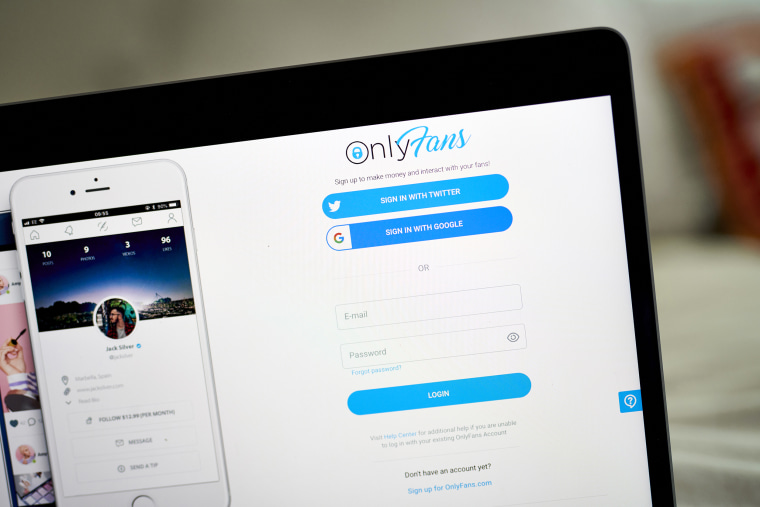LGBTQ sex workers ‘in limbo’ after OnlyFans policy change
OnlyFans, the online content subscription service, has faced widespread backlash from sex workers after it announced last week that it will ban sexually explicit content starting Oct. 1.
Some LGBTQ OnlyFans creators say the changes could jeopardize one of their primary sources of income during the Covid-19 pandemic.
Many sex workers, such as Stacey Monroe, 27, have been using OnlyFans to create sexually explicit video content and photos during the pandemic because they can’t see clients in person safely.
Monroe said she left her career in health care to focus on advocating for transgender rights after she faced discrimination from multiple past employers because she’s a trans woman. “However, being an activist is really a volunteer job, so there was no pay,” she said. In 2018, sex work “helped me and my sister get through our housing crisis and so many other things. It became our form of survival.”

Sex work has helped them maintain stability without facing employment discrimination. Now, Monroe said, 40 percent to 50 percent of her income comes from OnlyFans subscriptions.
“If I’m not able to see customers in person, then I do have to try to make OnlyFans content and things like that, so now I’m kind of in limbo trying to figure out what am I going to do on October 1 and trying to see if there’s a loophole or anything to work around the policy,” she said.
OnlyFans’ new policy will allow creators to continue to post nude photos as long as they are consistent with the platform’s acceptable use policy, but it will prohibit “the posting of any content containing sexually-explicit conduct,” a spokesperson said in a statement.
“In order to ensure the long-term sustainability of the platform, and to continue to host an inclusive community of creators and fans, we must evolve our content guidelines,” the statement says. “These changes are to comply with the requests of our banking partners and payout providers. We will be sharing more details in the coming days and we will actively support and guide our creators through this change in content guidelines.” https://iframe.nbcnews.com/U5CK7jN?app=1
The spokesperson declined to comment on when a nude photo could be considered sexually explicit or who would screen content and decide whether it violates the policy.
OnlyFans has provided a legal avenue for people to participate in sex work. Subscribers pay monthly or yearly fees in exchange for pornographic content or one-on-one live video chats with creators, among other content.
Transgender people are more likely than the general population to participate in sex work for a variety of reasons. As a result, many LGBTQ sex workers said the community is disproportionately — and negatively — affected by OnlyFans’ policy change.
A form of survival for trans people
In 2018, Monroe and her sister, who is also trans, were facing homelessness.
“We were sleeping in our car. We had contemplated suicide,” she said. “We just really didn’t have any options. We were going to homeless shelters, and they were telling us that we were not allowed there because we were trans and they didn’t know how to accommodate us.”
With support from their community, they were able to get back on their feet, and sex work has since helped them survive, Monroe said.
Monroe’s experiences of job discrimination and homelessness are common among trans people — including trans people who participate in sex work.
A 2015 survey found that 10.8 percent of trans respondents had participated in some form of sex work, with rates the highest among Black trans respondents (39.9 percent) and Hispanic or Latino respondents (33.2 percent). Transfeminine respondents were twice as likely to participate in the sex trade, at 13.1 percent, compared to transmasculine respondents, at 7.1 percent.
The survey found that more than two-thirds (69.3 percent) of trans sex workers reported having experienced adverse job outcomes in the traditional workforce, such as being denied jobs or promotions or being fired because of their gender identity or expression. In addition, those who lost jobs because of anti-trans bias were about 2 ½ times as likely to engage in the sex trade (19.9 percent vs. 7.7 percent of respondents who didn’t lose jobs because of anti-trans bias).

Monroe said sex work is a form of survival for many trans people, because it allows them to earn enough money to get safe housing.
OnlyFans has provided a safer — and legal — outlet for people to engage in sex work, especially trans people, who often face violence. At least 34 trans and gender-nonconforming people have been killed this year. Most of them were Black trans women, according to the Human Rights Campaign, and some of them were also sex workers, according to memorial posts and local reports.
Monroe said some trans people use OnlyFans to pay their bills and get health care, such as hormones, during the pandemic. As a result, the policy change could affect trans creators in many ways if it’s their primary form of income.
“A lot of us have found safety in not having to see customers in person, one, because of Covid-19, and two, because of the violence against trans people and how it’s been increasingly just getting worse and worse over the years,” she said. “It’s horrible. So we are going to be facing more safety issues, more issues with housing, medical, trying to just survive in general.”
Jeopardizing stability, safe space
Z, 27, said OnlyFans has provided them with a stable and safe source of income during the pandemic. They asked to go by their initial because they hope to get a job outside sex work in the future.
They are immunocompromised and disabled and were unable to leave their home at all before a Covid-19 vaccine was available.
They began using OnlyFans in November to sell lewd photos. They incorporated their mobility devices into shoots and described themself as openly queer. In their first month using the platform, they said, they doubled their average monthly income and were able to hire a personal care attendant to help them with their physical therapy exercises and daily activities, such as washing their hair and prepping meals.
They said the OnlyFans policy change will affect them because they don’t have an audience for the type of content that OnlyFans now says is within its terms of service, though they noted that they won’t be as affected as other creators who do more video content.
“I think that when you are specifically advertising sex worker services and then those services are no longer what you’re able to provide, nobody’s going to be there for that,” they said. “I don’t foresee getting a lot of income from people who would just want to see pictures of my smiling face every day.”
OnlyFans no longer makes up the bulk of Z’s income, but they said it does provide them with a few hundred dollars a month, which can cover their physical therapy, medication or groceries.
OnlyFans is used primarily by sex workers who sell pornographic content, but creator GothyKitten, 33, who asked to go by their username on the platform, used it to share time-lapse photos of their surgery site after they had gender-affirming surgery. They uploaded a year’s worth of images in late December.
“A couple folks have said that it really helped them with considering surgery, and everyone who asked for it said they couldn’t find any other resources as detailed,” they said. OnlyFans’ new acceptable use policy will ban “any exhibition of the anus or genitals of any person which is extreme or offensive,” and it doesn’t define “extreme” or “offensive,” leaving GothyKitten uncertain whether their content will be removed.
For now, they’ve created an account on AdmireMe.vip, a site that posted a message of support to sex workers after OnlyFans announced its policy change.https://iframe.nbcnews.com/468GgCb?app=1
For some LGBTQ OnlyFans creators, like Jack Mackenroth, 52, the platform’s new policy is disappointing but not necessarily negative. Mackenroth created an OnlyFans account to share gay pornographic content shortly after the site started in 2016.
He said that the site isn’t user friendly and that there are better platforms that were created by sex workers, like JustFor.fans, which also shared a message about OnlyFans’ policy.https://iframe.nbcnews.com/h8cOaI7?app=1
Sex workers made OnlyFans “what they are,” Mackenroth said, and now it won’t fight for the creators who helped build the site. “They seem to be fair-weather friends, and I don’t need those,” he said.
He encouraged OnlyFans creators to move their content to other platforms and diversify their sources of income.

LaLa Zannell, the Trans Justice Campaign manager at the American Civil Liberties Union, said being able to change platforms is a privilege not all sex workers have.
“A person who is navigating just surviving, navigating transphobia, xenophobia and homelessness doesn’t have time to create a whole new following on a new platform,” she said.
A number of websites that sex workers used, such as Backpage and Tumblr, were also shut down or changed their policies in ways that negatively affected sex workers, she said, in part because of policy changes by financial institutions that process their payments.
OnlyFans and similar sites have also faced pressure from conservative representatives and advocacy groups. Rep. Paul Gosar, R-Ariz., applauded the policy change, calling it “a remedy to child exploitation” in a tweet last week.
Gosar wrote a letter to the attorney general about a week before the site announced its policy change requesting an investigation into OnlyFans “for promoting, and profiting from, online prostitution.” The bipartisan letter was signed by more than 100 other members of Congress.
Gosar wrote on Twitter that the Justice Department had found that minors were getting through OnlyFans’ vetting process, which requires creators to have bank accounts, government IDs and face scans to ensure that their faces match the provided ID.
The Justice Department did not immediately respond to NBC News’ request for comment.https://iframe.nbcnews.com/48BjpYS?app=1
Zannell said banning pornographic content from platforms isn’t a solution, because it will just move to new platforms. But users’ constantly changing platforms isn’t, either, she said. She added that she’d like to have a sit-down with banking institutions, as well as anti-pornography and anti-sex-trafficking groups — which she said are among those pressuring banking institutions to clamp down on sites like OnlyFans — to “actually have a real conversation and carve out a real goal where all parties online can be on neutral ground, because sex work is real work.”